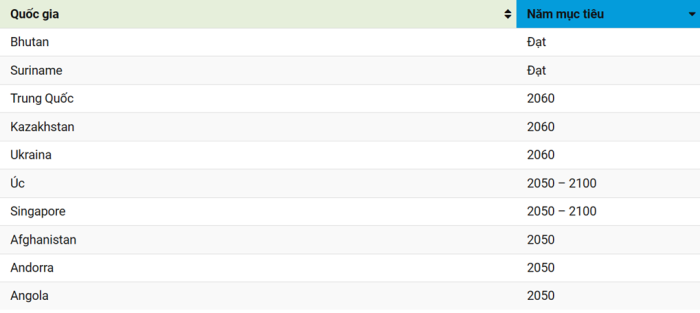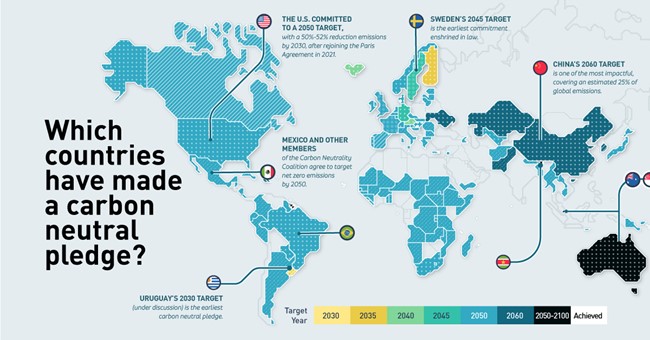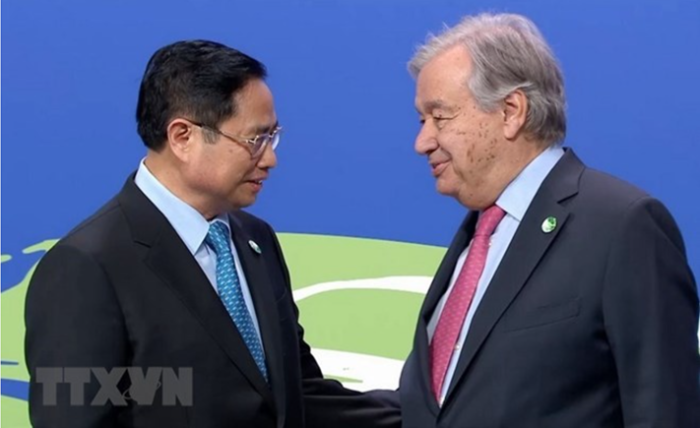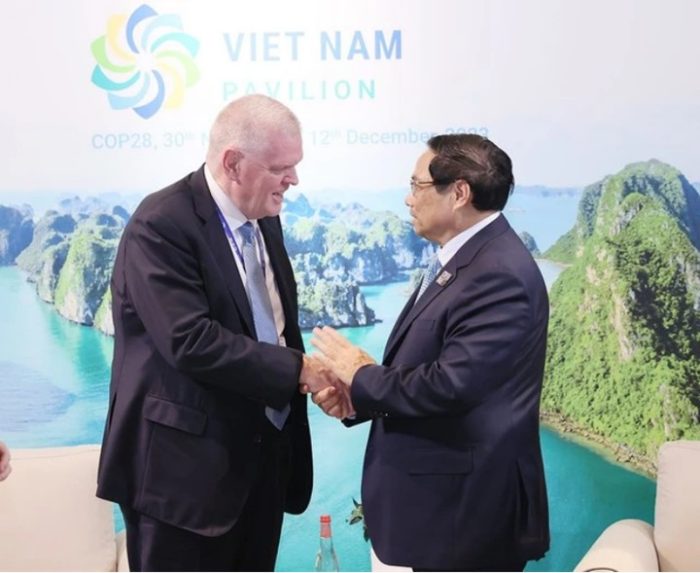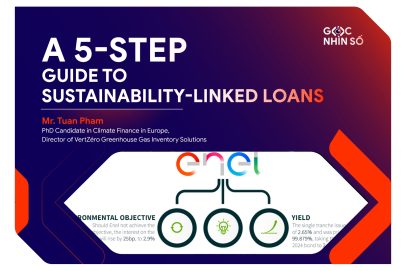The race towards Net Zero for Vietnamese businesses
Achieving Net Zero is a vital goal in the battle against climate change for the world in general and for Vietnam in particular. Climate change is an urgent global problem attributed to growing greenhouse gases in the atmosphere. These greenhouse gases, which include carbon dioxide, methane, and nitrous oxide, trap heat in the atmosphere and increase the Earth’s temperature.
In 2023, 140 countries around the world have set a Net Zero target to achieve net zero emissions. In other words, a business must absorb the quantity of emissions it generates, regardless of the amount it produces. While this is an ambitious goal, it is necessary to prevent climate change.
Net-Zero committed timeline of countries around the world
Most countries aim to reach Net Zero by 2050. However, the transition to a green economy takes longer in some developing nations, such China and India. They have set a target of reaching Net Zero by 2060 or 2070. Vietnam’s CO2 emissions have doubled over the past 10 years, placing it among the top 20 emitters in the world.
Timeline for Net-Zero of countries around the world
Vietnamese government’s action plans
The Vietnamese government always pays special attention to environmental protection. The state budget for the environment has consistently exceeded 21 trillion VND per year for the last five years. This significant expenditure demonstrates the government’s commitment to protecting natural resources and fighting climate change.
Public resources, however, are still insufficient to address needs in light of the rising challenges. To solve this problem, the government is actively mobilizing private resources and international organizations in addition to prioritizing public resources. In particular, developing green financial markets and carbon markets are key remedies.
The green financial market offers financial products to mobilize capital for environmental protection projects. The carbon market allows buying, selling and exchanging the right to emit greenhouse gases. As these two markets grow, it will provide investors and businesses opportunities to engage in environmental protection, supporting green growth and responding to climate change.
The United Nations Secretary-General highly appreciated Vietnam’s commitment to achieve net zero emissions at COP26. Image: VNA
For the purpose of reducing carbon emissions and achieving carbon neutrality, or Net-Zero, as agreed upon at COP 26, Vietnam will not build more coal-fired power plants after 2030. By approving the National Strategy on Climate Change, the National Strategy on Green Growth for the period 2021 – 2030, and a vision to 2050, the Government of Vietnam has shown its determination and aspiration to build a powerful, prosperous and sustainable nation. Vietnam, being a developing country, has boldly committed to sustainable development, consistently adhering to the principle of “not accepting growth at all costs”.
Prime Minister Pham Minh Chinh received Mr. Noel Quinn, Group Chief Executive of HSBC Group, on the afternoon of December 2, as part of bilateral activities at COP28
Mr. Noel Quinn, Group Chief Executive of HSBC Group, shared to the media during the COP28 conference that was held in Dubai, United Arab Emirates (UAE), saying that he was “very interested in and understands the Prime Minister Pham Minh Chinh’s vision in the roadmap for implementing commitments to combat climate change”.
Dr. Ha Quang Anh – Director of the Center for Low Carbon Development – Department of Climate Change, Ministry of Natural Resources and Environment – said: “Vietnam has focused on perfecting policy mechanisms during the last year, which is one of the most important first steps towards implementing its commitments. We have issued Decree 06, which governs greenhouse gas emissions mitigation and ozone layer protection; Decision No. 01, which lists sectors and greenhouse gas-emitting establishments subject to greenhouse gas inventory; Decision No. 148 of the Prime Minister on monitoring climate change; Decision No. 888/QĐ-TTg of the Prime Minister which approves tasks and solutions to implement the outcomes of the COP26 Conference on climate change; action plans to reduce methane emissions by 2030; the climate change strategy toward 2050; the NDC 2022 review and update, considering Vietnam’s Net Zero commitment, and a number of other related documents. NDC is a national determined contribution. A national determined contribution to climate response, including goals for greenhouse gas emission reduction and adaptation, policies and measures to respond to climate change to meet the objectives of the Paris Agreement.
The Ministry of Natural Resources and Environment has organized communication, training and capacity building programs for many classes and groups of people throughout the past year to raise awareness of climate change issues and Vietnam’s commitments at COP26. Communication and training will continue to be maintained in the coming years. Following its commitment at COP26, Vietnam has achieved some remarkable results in just one year.
Thus, we have gradually perfected the legal framework in terms of policy mechanisms to support the seamless execution of our commitments.
1. What new regulations should businesses be aware of?
Vietnam has focused on improving policy mechanisms to implement its Net Zero commitment by 2050. The government has published significant regulations, including:
- Decree 06 on mitigation of greenhouse gas emissions and protection of the ozone layer
- Decision No. 01 on the list of sectors, greenhouse gas-emitting establishments subject to greenhouse gas inventory
- Decision No. 148 of the Prime Minister on monitoring climate change.
- Decision No. 888/QĐ-TTg approved tasks and solutions to implement the outcomes of the COP26 Conference on climate change.
In addition, Vietnam has also approved the action plans to reduce methane emissions by 2030 and the climate change strategy for the period leading up to 2050. Reviewing and updating the 2022 NDC, which incorporates the Net Zero commitment, is an important part of these efforts. Additional relevant documents have also been issued to guarantee efficiency and consistency in Vietnam’s implementation of its environmental and climate change commitments.
2. Businesses must make necessary preparations to meet the target of reducing net emissions to zero (Net Zero) by 2050
Mr. Ha Quang Anh, a representative of businesses and organizations, stressed the business’s responsibilities in implementing climate change regulations and achieving net zero emissions goals. He explained that businesses must have a thorough understanding of climate change and the government’s commitment to the Net Zero target in order to meet these requirements.
Mr. Ha Quang Anh also emphasized the need to prepare financial, scientific, technological, and technical resources to shift production in the direction of low-carbon development. This is considered an important and practical step toward fulfilling realistic future requirements.
Businesses can turn awareness into concrete actions, taking examples from large Vietnamese corporations that identified the need and developed emission mitigation strategies to achieve carbon neutrality early on. Businesses must simultaneously plan resources for greenhouse gas inventory, propose and manage mitigation measures.
Thus, businesses need to quickly investigate the impacts of emissions resulting from their production activities. By recognizing the extent of the impact, businesses can quickly develop an action strategy to gain a competitive edge and leave a positive impression on investors, shareholders, customers and stakeholders.
At FPT Green Transformation, we have a team of seasoned climate change experts ready to support your business to quickly catch up, innovate, lead and develop sustainably.
Exclusive article by FPT IS Technology Expert
Pham Tuan
VertZero Product Manager
FPT Information System Company.


